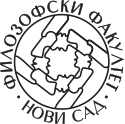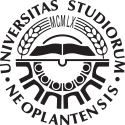15FLFL017 - Philosophy of Science
| Course specification | ||||
|---|---|---|---|---|
| Course title | Philosophy of Science | |||
| Acronym | 15FLFL017 | |||
| Study programme | Philosophy | |||
| Module | ||||
| Type of study | first degree undergraduate academic studies | |||
| Lecturer (for classes) | ||||
| Lecturer/Associate (for practice) | ||||
| Lecturer/Associate (for OTC) | ||||
| ESPB | 6.0 | Status | ||
| Condition | No additional requirements. | Oblik uslovljenosti | ||
| The goal | The central aim of the course is to introduce the students to problems and main trends of the modern philosophy of science. This implies the development of systematic interests in the structure of scientific knowledge and ways of argumentation in science also the formation of the social-historical interest in the development of science. The study of philosophy of science combines logical, methodological, epistemological, historical and social considerations about science but it exposes also the problems of ethical and social responsibility of the scientists. | |||
| The outcome | The expectation attached to this course is that the students will be able to form a critical judgment about the main conceptions in the theory of science and that they will recognize the philosophical relevance of some scientific problems. | |||
| Contents | ||||
| Contents of lectures | Concept, subject and classification of philosophy of science. The history of philosophy of science. Main positions: positivism, conventionalism, operationalism, critical rationalism, the methodology of research programs, constructivism, historicism etc. The controversies in philosophy of science: positivism dispute, Popper vs. positivism, Feyerabend’s attack on science as an institution, Foucault’s archaeology of natural and human sciences. The concept of science. Division between science and metaphysics (philosophy). Natural and social sciences. Inter- and transdisciplinarity. History of science. The concept of paradigm and the idea of scientific revolutions. Social influence on the scientific work. The chances and limits of science. Pseudoscience and criticism of science. Science crisis. Science ethics. | |||
| Contents of exercises | In seminaries the students read and discuss the works of the main representatives of scientific philosophy (Comte, Popper, Kuhn, Feyerabend, Lakatos etc.). | |||
| Literature | ||||
| ||||
| Number of hours per week during the semester/trimester/year | ||||
| Lectures | Exercises | OTC | Study and Research | Other classes |
| 2 | 1 | |||
| Methods of teaching | Dialogical method, text analysis | |||
| Knowledge score (maximum points 100) | ||||
| Pre obligations | Points | Final exam | Points | |
| Activites during lectures | 10 | Test paper | ||
| Practical lessons | 20 | Oral examination | 50 | |
| Projects | ||||
| Colloquia | 20 | |||
| Seminars | ||||

